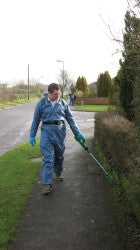Striving for sustainable herbicide solutions
 In order to be able to use amenity pesticides in the future, we have to prove that our industry is safe, accountable and legal in all areas of pesticide use.
In order to be able to use amenity pesticides in the future, we have to prove that our industry is safe, accountable and legal in all areas of pesticide use.
Nomix Enviro Managing Director, Mark Phillips, says that changing legislation will affect us all and we should be striving for sustainable herbicide solutions.
The EU Directive for Sustainable Use is designed to reduce risk to the public and the environment. It means the use of pesticides will be severely restricted. The EU Water Framework Directive covers water resource management. Our industry has to ensure pollution of water from pesticides (primarily including run-off) does not occur. This directive has confirmed that blanket spraying is no longer acceptable on hard surfaces. "If we don't take action now" says Mark Phillips, "the emotive 'ban' that everyone talks about is a real threat."
Mark explained; "It is essential that everyone in our industry stays legal at all times, and in all areas of pesticide application. This is straight forward as long as you are operating within the 'DEFRA code of practice for Using Plant Protection Products'. The code provides advice and guidance on how to use pesticides safely. As part of the code, you should only seek technical advice from a BASIS qualified advisor. If you follow the code, you will operate within the law."
Climate change
"Climate change has been scientifically proven and affects us all," continues Mark. "Today, we are faced with longer growing seasons, more invasive and new species of weeds, of which many are difficult to control. Green issues are dominating the political agenda. Therefore, it is vital that we adopt Best Practice and operate within the law. With a final use up date of December 13th 2008, Diuron was found in the water supply and has been withdrawn.
Without doubt, the amount of chemical we can use is going to be severely restricted. Our industry needs to demonstrate that we are using pesticides responsibly, therefore not posing a threat to the environment. We need to use a planned, sustainable approach to weed control, and look at tailored packages to meet future weed control requirements. Our methodology has to change as blanket spraying is no longer economical or operating within Best Practice," he explains.
Make the most of your weed control budget
"Weeds grow all year round as does grass," Mark adds. "We don't just cut grass once or twice a year. Weed control needs to be part of a continuous programme," he explains.
"At Nomix Enviro we encourage our clients to approach their weed control programme with a four step plan."
1. Look at all aspects of your weed control programme, for example public and operator safety, environmental impact, effectiveness and ease of use.
2. Choose a system which gives best value in all of the above areas and complies with requirements for the Sustainable Use of Pesticides.
3. Avoid blanket spraying on hard surfaces and associated costs of chemical waste, run-off and water pollution.
4. Plan for more applications and link with other in-house operations. Use less chemical more often and comply with Best Practice through a targeted sustainable approach.
Mark concludes, "The use of pesticides in the amenity industry is sustainable if everyone embraces the need to change and everyone operates within Best Practice. Failure to do so will result in further restrictions or a potential ban on the use of pesticides in amenity areas. Everyone needs to embrace the change now and operate accordingly."
